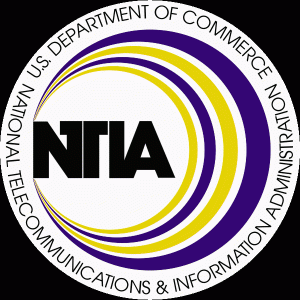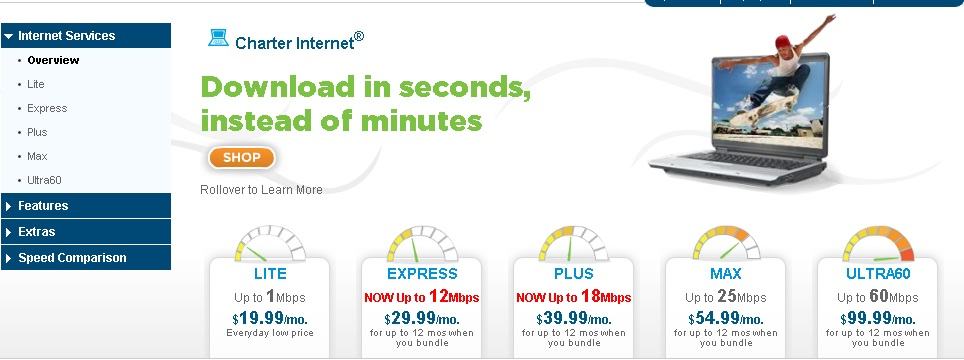 Charter Cable is upgrading its broadband service to deliver free speed upgrades, but with the company’s Internet Overcharging-usage cap scheme in place, some customers are not impressed.
Charter Cable is upgrading its broadband service to deliver free speed upgrades, but with the company’s Internet Overcharging-usage cap scheme in place, some customers are not impressed.
“We plan to streamline Charter Internet options to: Lite, Express, Plus, and Ultra,” Charter social media rep “Eric” wrote on the Broadband Reports‘ Charter customer forum. “Current Max customers will be able to move to a different level of Internet Service.”
The company’s boosted speeds (prices vary in different markets):
- Charter Lite: 1Mbps/128kbps → Unknown ($19.99) 100GB limit
- Charter Express: 12/1Mbps → 15/3Mbps ($44.99) 100GB limit
- Charter Plus: 18/2Mbps → 30/4Mbps ($54.99) 250GB limit
- Charter Max: 25/3Mbps → Discontinued ($69.99) 250GB limit
- Charter Ultra: 60/5Mbps → 100/5Mbps ($99.99-109.99) 500GB limit
Charter has usage caps on all of its residential broadband service plans, but Stop the Cap! readers tell us they are not always enforced. No overlimit fees are charged. No announcements have been made about any changes to the existing usage limits. Some Charter Max customers tell us they are using the speed upgrades an an excuse to downgrade to the cheaper Plus plan, which is faster and $15 less a month, with the same 250GB usage cap. Customers who absolutely won’t tolerate a usage limit have to upgrade to commercial-grade service, which is considerably more expensive. Lower speed plans run about $80 a month in many areas, but are unlimited.
“I’m glad to discover faster upload speeds, which I’ve waited for a long time, but I’d rather have no usage limits to worry about instead of faster speeds,” shares Stop the Cap! reader and Charter customer Paul McNeil. “My problem with these faster speeds is that you can’t use them for too long. Why buy a luxury race car you can only drive down the street?”
Light users who use the Internet primarily for e-mail or web page browsing rarely require more than the most budget-priced broadband package because high speeds do not deliver a significantly improved user experience. But those who use the Internet for higher-bandwidth applications including video, downloading, certain online games, and file backup do benefit the most from high speed packages. But when providers slap usage limits on them, the value erodes away.
“Why spend more for less?” asks McNeil. “Two years ago there were no limits and I honestly received more value from my Charter Internet service then over what I have to deal with now.”


 Subscribe
Subscribe





